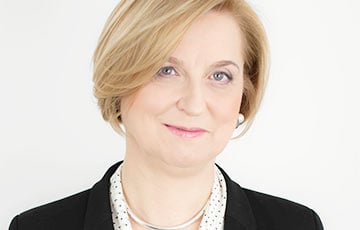Anna Fotyga: Lukashenka's Words Are A Kind Of Game
1- 4.06.2024, 10:35
- 8,054

The Belarusian dictator must know that the Poles will defend their country.
How should we react to Lukashenka's statements about the Suwalki corridor? Is NATO ready to defend the eastern borders?
These questions and more Charter97.org discussed with Anna Fotyga, a member of the European Parliament and former Minister of Foreign Affairs of Poland.
— Will Ukraine receive sufficient assistance from the United States before the moment comes when it is necessary to surrender more territories to the enemy?
— I hope it doesn't get to that point. I believe that this time is a very dangerous challenge for the whole world. Once the world was able to mobilize against Hitler and put an end to that terrible war, including by pursuing an appropriate policy towards the aggressor. At the moment, such actions are necessary against the aggressor — the Russian Federation and its accomplices. One of them is the Lukashenka regime. In addition, the regime acts extremely radically, committing serious crimes against its own society — this is an unprecedented situation.
Previously, I held a number of meetings in Washington at major think tanks, the State Department, Congress, and the Senate. I understood that it would come to a breakthrough regarding the approval of a new aid package. I know that a certain mobilization is ongoing: the Supreme Commander of the United Armed Forces in Europe, General Cavoli, speaking before a congressional committee, said that this assistance is necessary and noted that no bad agreement ("dirty deal") will tame Putin's appetites, but will only give Russia time to prepare a larger-scale attack on Ukraine, absorb Belarus or attack NATO. In my opinion, Russia should not be given the opportunity and time to gather forces.
— Does Europe have the opportunity to support Ukraine?
— Central Europe has experience of subordination to the Soviet Union and, I believe, more realistically assesses the dangers and challenges. Indeed, compared to a few years earlier, the situation in Western Europe has changed, however, I am afraid, these changes relate mainly to the scope of statements. Although decisions on the allocation of financial resources are made, it turns out (as in the case of applications for the supply of ammunition) that the efforts made are extremely insufficient to fulfill their own promises. Consequently, European security requires the support of the United States.
Another problem is the resources that the world has, the number of conflicts that it has to deal with. This is a puzzle for Washington. These difficulties are not only related to political will. There are also material factors.
— Lukashenka talked about a possible attack on the Suwalki corridor. He said that he was preparing for war. How would you comment on these aggressive statements?
— I am very careful in commenting on such statements. Politicians like Lukashenka like to amplify their sense of self-importance with statements designed to cause some confusion or even fear in certain circles.
Such statements reinforce the narrative that the West needs to enter into negotiations with the Russian Federation behind the backs of Ukraine or put pressure on Ukraine to enter into negotiations with the Kremlin. In any case, at this stage of the war, such an agreement would be a concession to Russia and its allies.
Lukashenka's words are a kind of game. In part, this is also an attempt to intimidate society inside, especially people of Polish origin living in Belarus. Since the beginning of this full-scale invasion, Lukashenka has tried to divide society in this way and attacked the Polish community. This always causes anxiety and certain concerns among Polish society.
I don't want to sound too harsh, but military experts know the difference in potential. The Suwalki corridor is part of NATO territory.
— In your opinion, in the event of an attack, will there be solidarity of the entire NATO?
— We have always been realistic during our rule. We knew that great solidarity comes when an ally like Poland takes its responsibilities seriously without waiting for others to protect it. And we won't wait for others to protect us.
The US President said that guarantees regarding Poland are ironclad guarantees. And knowing this, we intended and intend to arm ourselves to the teeth, improve training, engage in civil defence.
Polish families have an understanding that they may have to defend their country. We will never attack anyone, but we will defend ourselves. And each of us will defend Poland. So it's better for Lukashenka to know it.
— How would you assess the threat to NATO's eastern flank now and in the medium term? What NATO actions could mitigate this threat?
— It all depends on how events develop. Ukrainians want to fight and defend their country. Russians also increasingly feel on their territory that their country is an aggressor and is at war. There is no doubt that the Ukrainian people cannot even imagine surrendering. There is no doubt that solid, large-scale assistance to Ukraine at this time, which would allow it to launch a serious counteroffensive, would reduce the immediate threat. Concluding any agreements with Putin would give the Russian Federation time to gather forces.
We need to be aware that we live in a time of long-term threat, which will change its nature depending on the development of events. Russia has not abandoned its aggressive plans. It will not be satisfied with part of Ukraine. The Kremlin's appetite extends much further. In addition, there is a consolidation of a bloc of authoritarian leaders, whose actions are largely directed against the West.
As a politician working in the field of security, I will do everything possible to reduce such a threat – and this excludes agreements with Putin or with Lukashenka. I am absolutely sure that deterrence methods can be effective.











